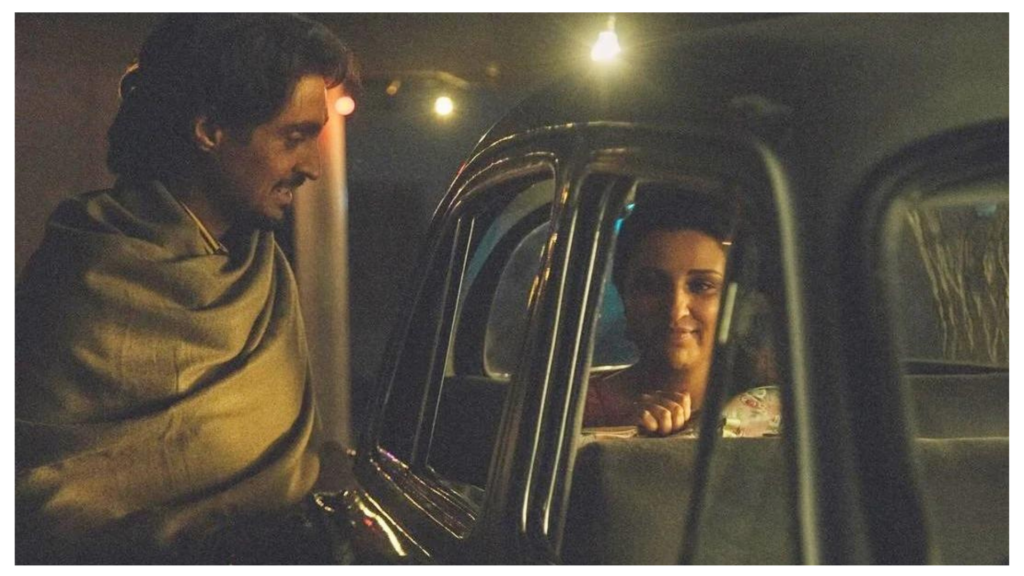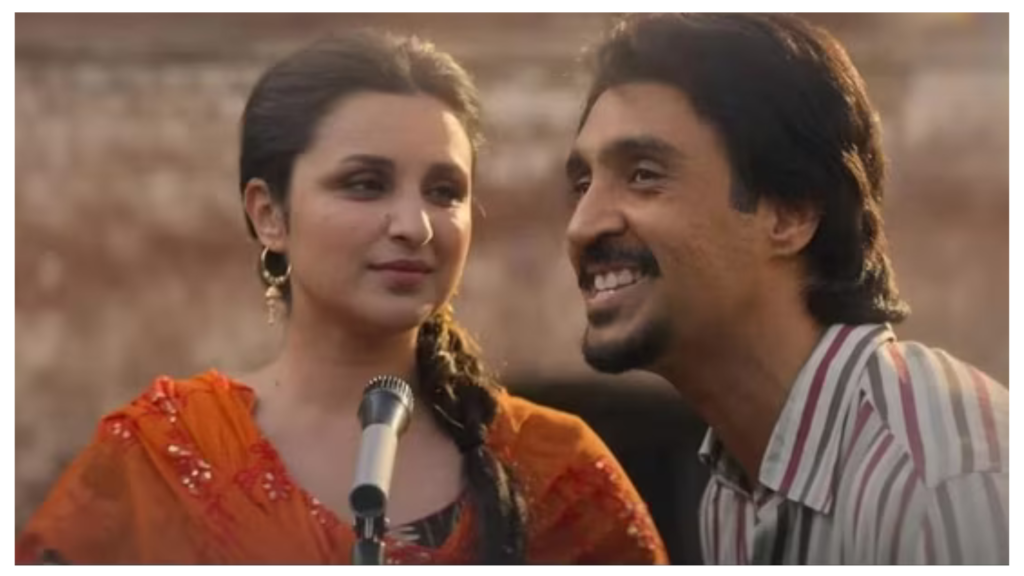Imtiaz Ali’s ‘Amar Singh Chamkila’ begins at the conclusion. From when everything seemed to be over. Diljit Dosanjh stars as the intriguing Punjabi folk musician Chamkila, whose burgeoning career is cut short by his violent murder.
Amid the sorrow, the tone changes as we join the discussion between the police officer investigating his murder and the guy who has lost his ‘Ustaad’. Chamkila and his wife, Amarjot Kaur, covered in white blankets are a sorrowful sight, with their blood ruining the Punjabi music business.
The film is a remarkable account of a guy who simultaneously became a tremendous celebrity and was destroyed by his bravery. What is most striking about it is that we nearly always witness both his ascent to prominence and his impending demise occurring simultaneously. Chamkila’s unique personality shines through at all times, even when he is threatened with death by competing musicians and Khalistani militants.

‘Amar Singh Chamikla’ appears to be a biographical drama, but it quickly delves deeper into the mysteries of innocence, wickedness, and a man’s urge to legitimize himself in the face of mounting criticism. Director Imtiaz Ali has deviated from his usual post-teen love cliches, and I agree with music director AR Rahman when he tells The Hindu that “Imtiaz has reinvented himself” with the film.
WATCH AMAR SINGH’S CHAMKILA TRAILER HERE.
This film is not intended to be a documentary on Chamkila’s double-entendre songs, which earned him and his fans the nickname ‘ganda banda’ (a dirty guy) by self-proclaimed watchdogs of society. However, it is also a criticism of the society and times in which Chamkila lived. Imtiaz, together with script creators Nidhi Sethia and Richa Nanda, have demonstrated how the 1980s Punjab insurgency affected Chamkila’s life and profession.
‘Amar Singh Chamkila’ cuts back and forth in time, using archive video from a variety of sources, including Chamkila and Amarjot’s entire akhaadas (stage performances) in Punjab, to heighten the emotional connection with them. Some situations seem caricaturish, and it’s difficult to understand why. They don’t work, but their appearance on screen is, fortunately, brief.

The film’s success stems not just from its outstanding storyline but also from its music and acting.
Imtiaz and Rahman have left Chamkila’s original melodies intact, preserving the nostalgia of his admirers and exposing many, like myself, to his music from four decades ago. Aside from his original song, AR Rahman and lyricist Irshad Kamil have perfectly captured the earthy flavor of Amar Singh Chamkila’s music in their own compositions.
The song ‘Baaja’, with vocals by Mohit Chauhan, appropriately captures Chamkila’s journey to prominence during the 1984 riots: “Sakht waqt tha, woh bhay bhayyanak tha.Chamkila chamka, aise mein…Chedta chhabeela, bistaron ki leela, sexy geet gaata tha. (It was a difficult moment, and he was afraid, but he shone through it with his seductive, sensual melodies.).

While Diljit and Parineeti’s ‘live’ performances on Chamkila and Amarjot’s songs are noteworthy, Rahman’s vocals in the Punjabi number ‘Bol Mohabbat’ astound you.
Diljit Dosanjh is brilliant in character, being electrifying, vulnerable, naive, aggressive, and everything else required to depict the charm of the guy who shook Punjab to its core in the 1980s. He is one of the primary reasons why the film is so captivating. Parineeti is a good fit for Amarjot, who is meek, quiet, and obedient.
Chamkila’s accomplices, some of whom seem strikingly similar to their real-life counterparts, perform their greatest job in a short period of time. Anjum Batra’s performance as Kesar Singh Tikki, the first musician to collaborate with Chamkila, stole the show with his impeccable comedic timing and controlled emotional moments.

The film’s moral is cruel, tragic, and unavoidable: Amar Singh Chamkila was a guy who brought joy to many people but felt very little of himself because he refused to embrace his transformation from Dalit laborer to respected musician. He always viewed himself as a’servant’ to his audience.
“There was a major flaw in Chamkila.” He stayed a servant to his listeners,” his buddy Swarn Sivia (Apinderdeep Singh) remarks in the film.
‘Amar Singh Chamkila’ is worth seeing only for the music and Diljit Dosanjh’s performance. What distinguishes it is its ability to go deeper and provide insight into the guy himself. Imtiaz Ali quickly sympathizes with Chamkila as both a performer and a guy.



